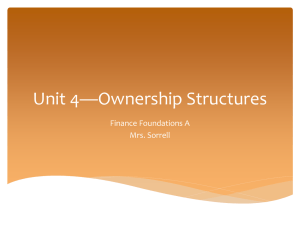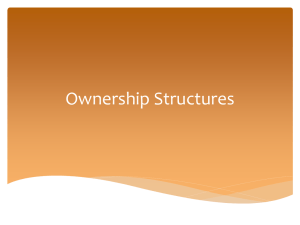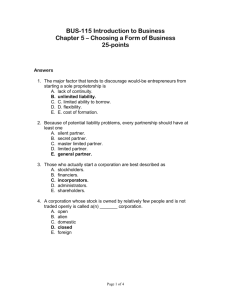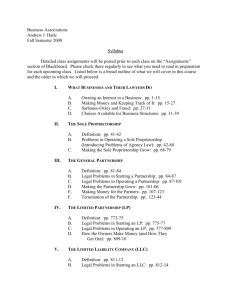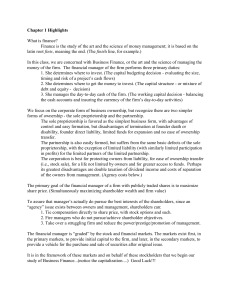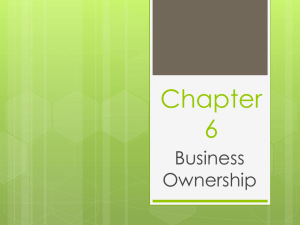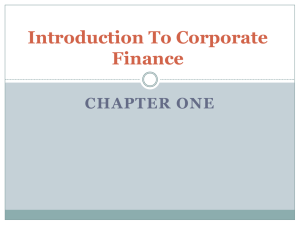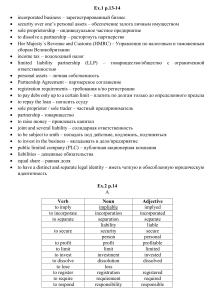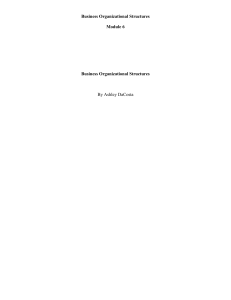BUSINESS OWNERSHIP
advertisement
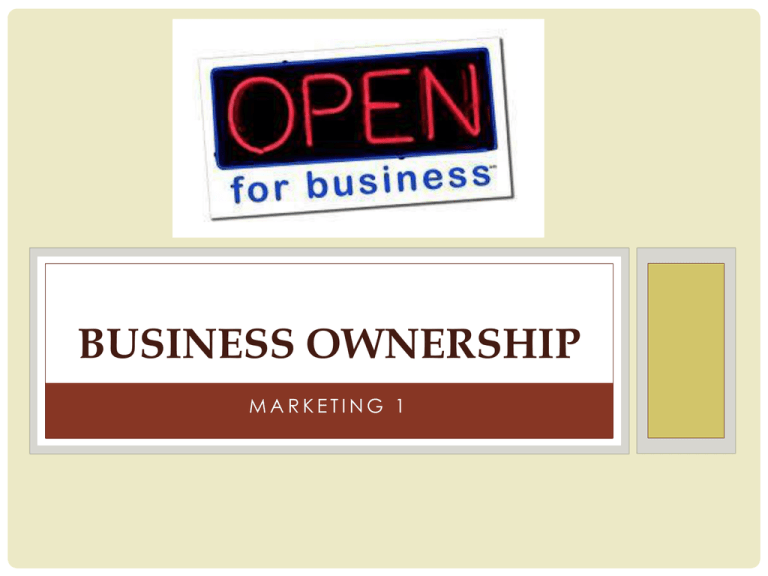
BUSINESS OWNERSHIP MARKETING 1 BUSINESS OWNERSHIP • A characteristic of free enterprise- private ownership • Types of ownership determined through the legal organization of the business • Type of ownership is key decision for entrepreneur • Four forms of business ownership FORMS OF BUSINESS OWNERSHIP • Sole Proprietorship • Partnership • Corporation • Limited Liability Company (LLC) SOLE PROPRIETORSHIP • Owned and operated by one person • Most common form of business ownership • Approximately 70% of all U.S. businesses are sole proprietorship • Sole Proprietor provides all of the skill, money, and management to run the business • Assumes ALL risk- unlimited liability • Retains ALL profit • Income taxed as personal income EXAMPLES OF SOLE PROPRIETORS • • • • • • • • Housekeeping service Landscape service Plumber Electrician Web site designer/manager CPA/ Accounting service Shop/boutique owner Restaurant owner Business where ONE person owns and operates the business PARTNERSHIP • Legal agreement between two or more people for joint responsibility for success or failure of business • Represents about 10% of businesses in U.S. • Formed by partnership agreement- legal document • Specifies responsibilities of each partner • Profit/Loss shared by partners TYPES OF PARTNERSHIPS • General Partnership • Limited Partnership GENERAL PARTNERSHIP • Each partner shares in profits and losses • profit taxed as personal income for each partner • Unlimited liability for company debts LIMITED PARTNERSHIP • Each partner responsible for debt of company but limited to the amount of investment in the company • Required that there is at least ONE General Partner who has unlimited liability • In exchange for limited risk, limited partners do not have a voice in the management of the company • Withdrawal of a limited partner does not dissolve the company CORPORATION • Owned by several people but is considered “one person” under the law • Must obtain legal permission by state to operateprocess begun with an application to state • Once permission granted this becomes the charter for the corporation • Considered to be a separate legal entity • can borrow money, take out loans, sue, sign contracts, and buy and sell property CORPORATIONS • Stockholders are owners of company- can sell stock to raise capital for the corporation • Stockholders elect Board of Directors to run the company • Board of Directors make top management decisions affecting the business • Corporations offer owners limited liability (personal affects of owner cannot be taken if company does not meet its financial obligations or is sued) • Corporation is not affected by death, incapacity, or bankruptcy of a stockholder or officer TYPES OF CORPORATIONS • Private- formed by private persons; broad category; can be “closely held”- which does not sell stock on open market or “publicly held”which does sell stock • Public- created by federal, state, or local government- can include schools, transit LIMITED LIABILITY COMPANY (LLC) • Relatively new form • Hybrid of partnership & corporation • Owners (called members) are shielded from personal liability • All profits/losses pass directly to owners without taxation CLASS ACTIVITY • Students work individually • Compare and contrast the advantages and disadvantages of each form of business ownership • Chart will be provided by teacher • 50 Points
